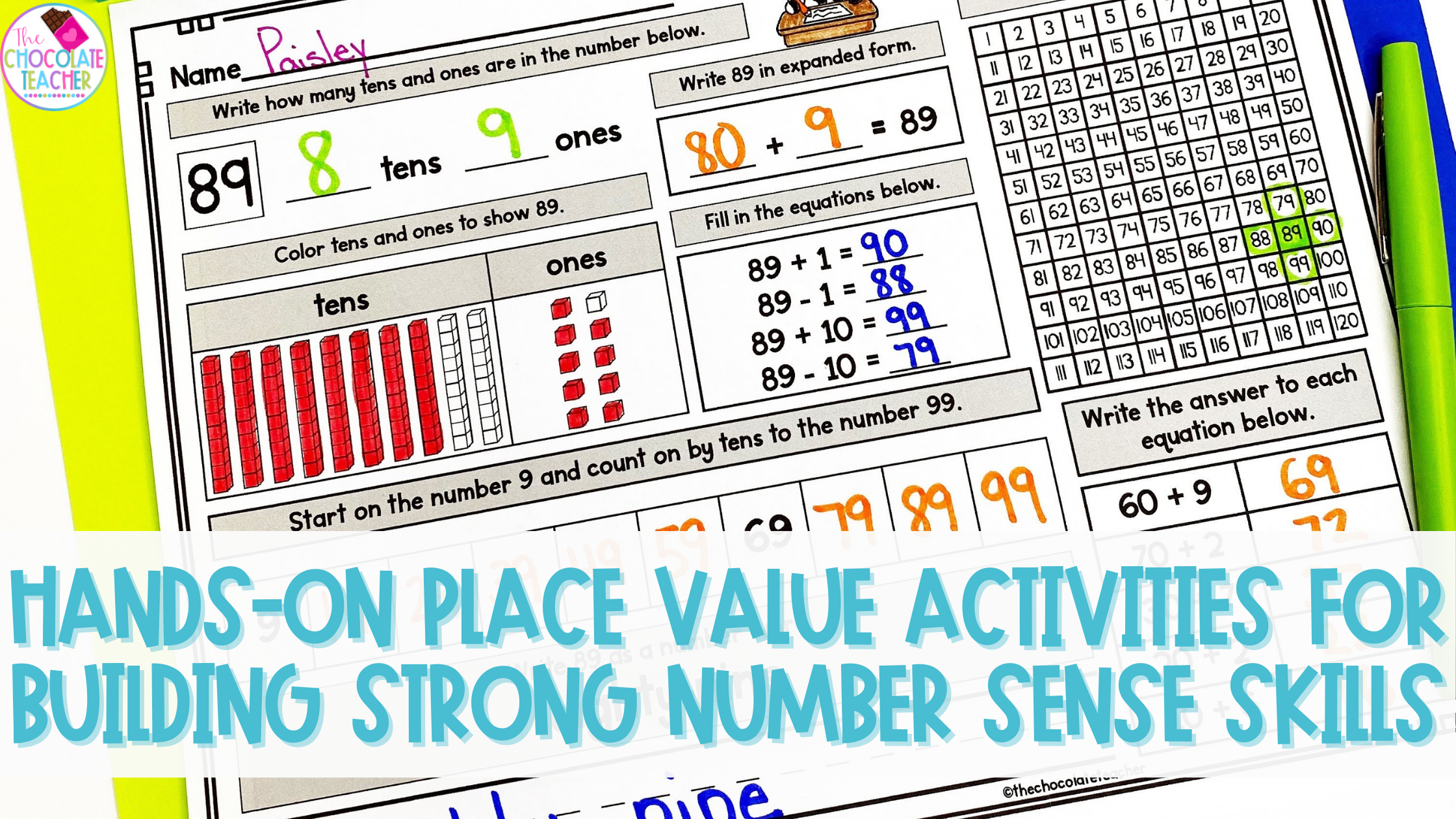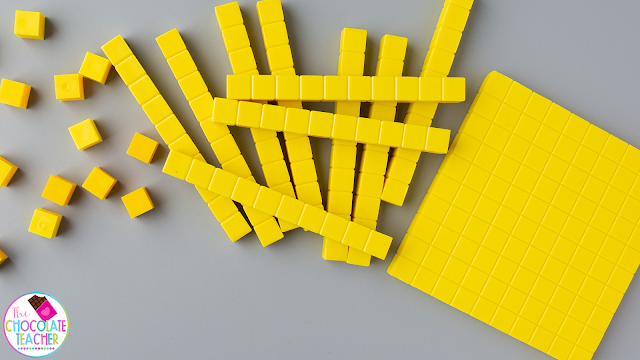Number sense is one of the most important concepts we teach as primary teachers. Understanding place value is an important part of building a strong number sense. These are skills our students will use for the rest of their lives. As a primary teacher, using a hands-on approach to teaching place value is imperative because it helps our students see, touch, and manipulate otherwise abstract concepts.
The Place Value Box
Building opportunities for my students to work on place value using manipulatives is something I do on a daily basis. We work with numbers every day using our place value boxes.
Each place value box is created using a plastic food storage box that has compartments. You can use one with 2 or 3 compartments, but just make sure the largest area is big enough for a 100-block. Inside each student gets a hundred blocks, 9 ten rods, and 9 one's cubes. You can adjust the number of hundreds blocks if you work with higher numbers.
While I have been able to set up a box for each student, I know that this might not be possible. Please know that all of these hands-on activities can also be done on a smaller scale during math centers. Adjust this activity to meet the unique needs of your classroom! Once the boxes are created, you are ready to give your students lots of hands-on place value learning.
Number Mats for Place Value Practice
Using different number mat activities, students have opportunities to work with numbers, compare numbers, order numbers, and more. I have some number mats that we use all throughout the year for plenty of hands-on practice. The best part about the mats is that by changing out the numbers, you can have an activity that allows each student to work at their level.
This Base Ten mat is the perfect place to start. Students can draw a number card, or you can provide a number that the whole class works on together. Students will use the base ten blocks from their box to build the number. When we do this as a class, it is really easy to walk around and monitor as students are working. In just a couple of minutes, I can get a very good idea of who is struggling with this concept.
After students have worked with individual numbers, we start working on comparing numbers. This skill requires that students already have some understanding of the numbers. Since we are using a hands-on approach, students can begin learning about comparing numbers by building the numbers and then comparing them.
It is great to not only have students build the numbers, but also to walk them through the thinking skills of comparing numbers. It is important for us as teachers to model our thinking at the beginning, and then give students plenty of opportunities to explain their thinking too.
Finally, after learning the concept of comparing 2 numbers, we begin working with multiple numbers and ordering them. This progression of activities helps students build their knowledge and understanding of numbers and how they relate to each other. That is number sense!
Daily Number Sense Practice
In addition to our daily hands-on practice, we also develop our number sense each day with our Daily Math pages.
On each Daily Math page, students work with the target number in a variety of ways. Students can use the manipulatives from the place value box to help them complete the page if needed. Over the years, I've found that adding this extra step of daily place value practice pages is a great way to bring the lesson full circle. Taking what students have practiced in a hands-on activity and transferring that skill to a written activity helps students bridge the gap to the abstract concepts of math.
You can find all of the daily math pages AND the number mat activities in my Daily Math sets. This bundle covers numbers from 1 to 120 in a monthly progression that builds on the skills of the prior month. The bundle will provide you with a full school year of daily math practice and number mat activities.
If you are looking for higher numbers, then check out the 2nd Grade Place Value & Number Sense Bundle that helps students work on numbers to 1,000. The same great hands-on and daily place value activities, just a little more advanced.
Place Value Centers
Center time is a valuable opportunity to strengthen place value skills. The key is to choose engaging center activities that are easy for students to use independently. For example, try these FREE 1st-grade math task cards in centers or as a partner activity. They're great for practicing place value with tens and ones!
These self-checking cards have images of numbers using base ten blocks, ten frames, and groups of bananas. Students will "poke" the correct answer with a coffee stir-stick or small straw. Then, they can flip the card to see if they answered correctly! This is a wonderful way to allow students a chance to practice independently, but still correct mistakes immediately!
Place Value Games
Kids love games, so incorporating games into their math centers is another great way to practice the skills they have been learning. These fall-themed number games are a great way to get students working with numbers at the beginning of the school year.
Students love a spin-and-build game where they race a partner to see who can spin to 20 first. After spinning, students will add the right number of pumpkins to their board. When they reach 10, they will practice exchanging the ones for a ten. Not only is this great place value practice, but it also sets the stage for addition principles too.
Another favorite is the pumpkin counting game, where students take their knowledge of place value and connect it to ten frames in order to determine the number. Finally, students will find and cover the number on the pumpkin. What looks like a simple number game actually has students using and connecting multiple number recognition skills.
You can find all of these fall-themed math games (and more, too!) in my store on Teachers Pay Teachers.
Digital Place Value Activities
Another great option to continue working on place value skills in your classroom is to incorporate digital activities. These are great because they often feel more like a game than schoolwork to students. They're ideal for center time, partner games, fast finishers, or even whole group games up on the interactive white board.
This set of fall-themed tens and ones digital place value games is just the thing to boost engagement in your room! Students will love the interactive features as they drag and drop place value blocks and pumpkins to show how many. If you choose to use this for whole group learning, simply project the slides up on the interactive whiteboard and work through a slide together. This can be a wonderful, visual teaching tool for your classroom!
The Place Value Progression
There are many ways to get students working with place value. I always start with hands-on activities, and using base ten blocks is a key component of that. We then work to make the connection to written examples of numbers like ten frames, tally marks, and number lines. Each is a step towards mastering number sense.
Following up with fun, themed games are a great way to tie your place value activities together and truly cement these number sense principles. Using this variety and progression of activities is my favorite way to ensure continued growth in place value skillset! Find all of these and many more place-value activities in my store on TPT.
Save these Ideas!
Pin this to your favorite classroom Pinterest board so you can come back to these hands-on place-value activities when you are ready for them.




.png)












0 Comments